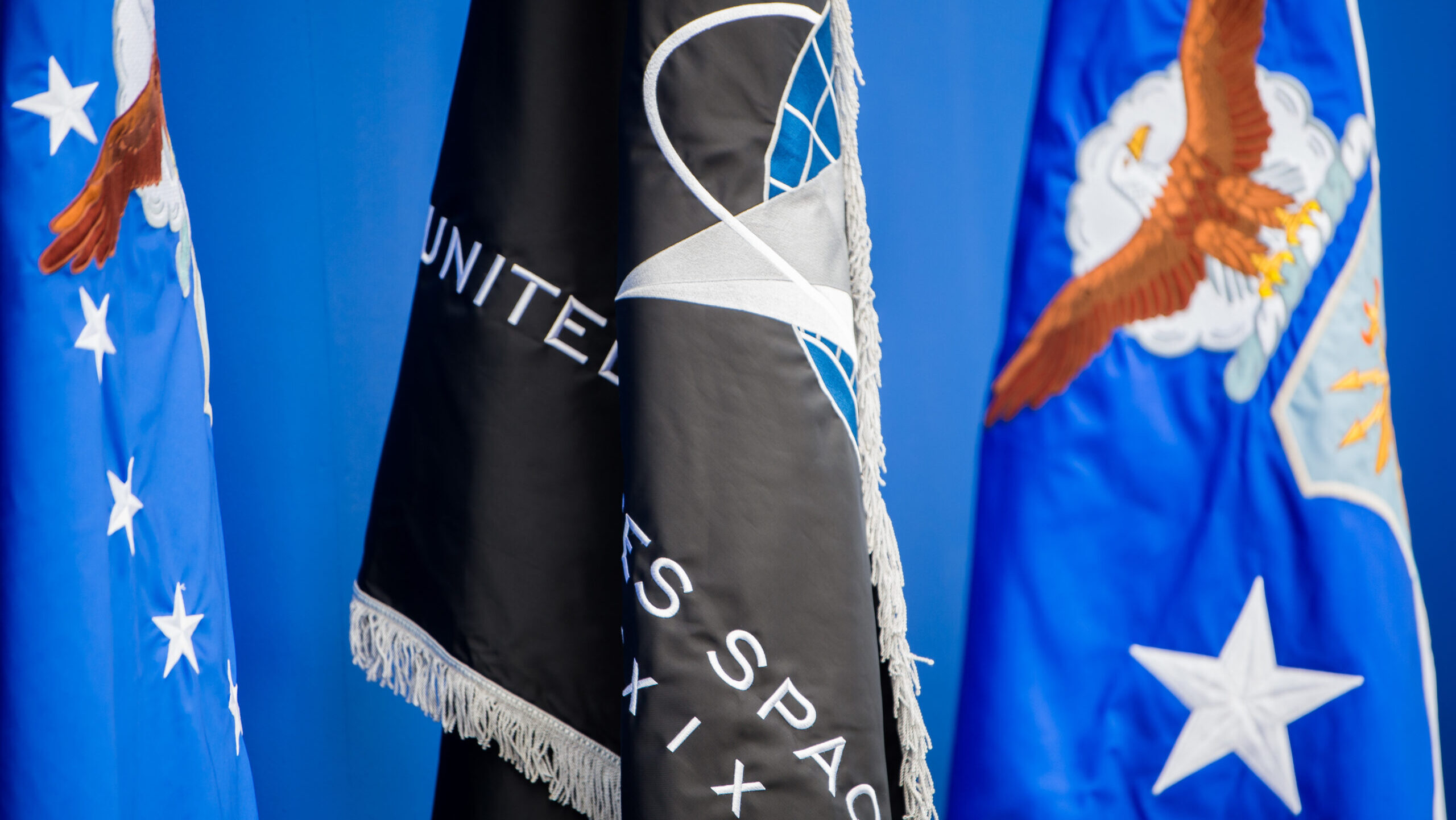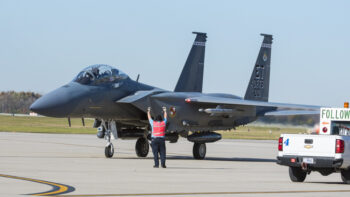
The new Space Force flag rests between the Air Force and Air Force Academy flag as Lt. Gen. Richard Clark takes over as Superintendent of the Air Force Academy during a Sept. 23, 2020 Change of Command Ceremony at Falcon Stadium. (U.S. Air Force Photo by Trevor Cokley)
When lawmakers come back from their Thanksgiving break, a key priority will be negotiations on the Pentagon’s annual authorization bill. Within that, Congress could decide to establish a Space National Guard (SNG) -— or not. In the op-ed below, Brig. Gen. Mike Bruno, chair of the Space task force at the National Guard Association of the United States and director of the Joint Staff of the Colorado National Guard, argues in favor of an SNG and points out where he thinks critics are a bit lost in space.
Correcting the erroneous notions surrounding the establishment of the Space National Guard (SNG) can often feel like a game of Whack-a Mole. You can keep hammering them down, but they just keep popping up.
The truth is the Space National Guard, currently operating as the National Guard Bureau Space Operations Directorate, is already built and funded and has been performing vital space missions for over 27 years with nearly half of its units currently deployed or employed-in-place on federal orders. The USSF continues to rely on this proven and critical capability. Unfortunately, these units were orphaned when Congress failed to establish a Space National Guard alongside the creation of the U.S. Space Force (USSF) in 2019. The simplest solution to this problem would be to establish the SNG as soon as possible, but persistent myths continue to get in the way.
RELATED: Draft House NDAA would create Space National Guard
The perception among Space National Guard opponents is that it would unleash a bureaucratic Pandora’s box. They believe the SNG would complicate matters for the nascent Space Force and create a feeding frenzy in which every governor in the United States would clamor for their own mini–Space Force, thus tying up Guard units and creating inefficiencies. This belief is centered on three general fallacies:
- Space operations policy must be conducted at the national level and creating a Space Guard will complicate the Space Force’s ability to perform its mission.
- State and local governments don’t need space units.
- If we let some states have Space Guard units, everyone will clamor for them, and that’s bad.
Let’s examine these points.
First, the Space National Guard would support national policy and objectives, just as the Army National Guard and the Air National Guard have been doing for a century. National Guard units meet the same standards as the active force and have supported federal missions since the establishment of the Dick Act over 100 years ago. The assumption that establishing a Space National Guard would change a century’s worth of proven history is absurd. Establishing the SNG as the primary reserve of the Space Force would follow an already successful track record of inter-component cooperation.
RELATED: Top Guard space officer fears readiness loss as Space and Air Force processes diverge
Second, the idea states don’t “need” the SNG is a red herring and a misunderstanding of the purpose of the National Guard. The federal mission of the Army and Air Guard is to act as a primary combat reserve for their respective branches. At any point, many Guard units are performing federal missions. For example, ANG fighter units perform 94 percent of the total homeland defense mission.
The fact that those fighters are under the command of their respective governors when not on federal orders has no impact on their ability to support federal national security objectives. Yes, both the Army and Air Guard also dual hat a domestic mission, but can the nay-sayers provide an example of when a Guard unit didn’t answer the call to federal service? Unlikely, considering it has never happened in modern memory. Guard units across the country have answered the call time and time again, and the SNG will do the same thing supporting our national objectives in the space domain.
Third, the idea that creating a Space National Guard will lead to units popping up in every state is a straw man fallacy. That’s never been the goal. Proponents of Space National Guard are simply asking for the existing Air National Guard units performing space missions to be folded into the Space Force in the simplest way possible: by establishing the SNG. The cost of this endeavor would be about $250,000 and requires changing out some name tape and replacing a few signs, according to the National Guard Bureau. Alternatively, migrating existing Air National Guard space missions into the USSF would cost between $732 and $886 million and up to ten years’ worth of retraining. Good luck convincing Congress that’s the better choice when they could stand up an entire component for the equivalent of a Pentagon rounding error.
Finally, the notion that a governor can just create a National Guard unit out of thin air ignores how the Guard works. All Guard units are funded by Department of Defense appropriations which would also be the case for the SNG. The Department controls growth through funding, basing, and federal recognition. Therefore, a Space National Guard would be established with the existing 14 units, and any future growth would only be determined by the Air Force.
The fact of the matter is establishing the Space National Guard is a bargain for taxpayers and is the simplest way to give the USSF the reserve component it needs. Don’t let the nay-sayers convince you otherwise.
Brig. Gen. Mike Bruno is the chair of the Space task force at the National Guard Association of the United States and director of the Joint Staff of the Colorado National Guard. He has over 25 years of experience supporting and performing space operations missions. The views expressed are those of the author and do not necessarily reflect the views of the Colorado National Guard, U.S. Air Force, or the Department of Defense.
Sullivan: Defense industry ‘still underestimating’ global need for munitions
National Security Advisor Jake Sullivan said that there are “no plans” for another Ukraine supplemental at this point.


























